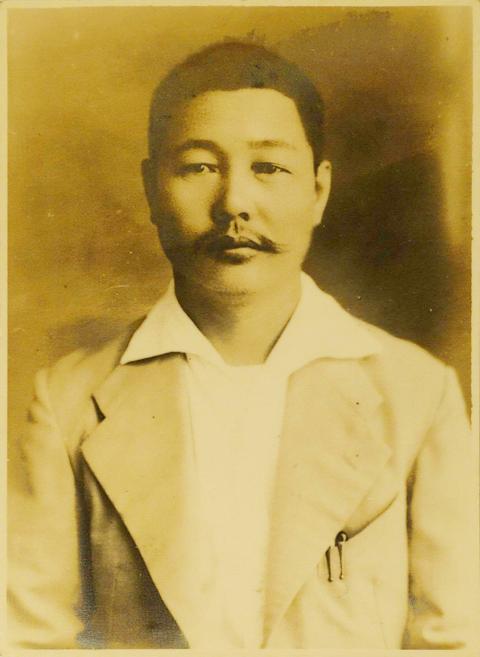Lai He was born in Changhua on May 28, 1894 and died in 1943. He was arrested in 1923 for participating in a political protest, and was a leading figure in Taiwan’s literary circles during the 1930s. While he was editor for the literary arts section at Taiwan Minpao, he published numerous articles, such as “The awful state of Taiwan’s literary circles,” attacking conventional literature and promoting a new nativist literary movement in Taiwan. He was the first writer in Taiwan to write poetry and novels in Hoklo, also known as Taiwanese, and is often praised as being the father of Taiwan’s nativist literary movement.
After Lai graduated from the Taipei School of Medicine, a predecessor to National Taiwan University’s College of Medicine, he opened his own clinic in Changhua and always reduced or waived payment from the poor. People in Changhua respectfully call him “the Changhua Matsu,” in reference to the goddess of the sea. The Lai He Memorial Hall and the Lai He Culture and Education Foundation are currently located at Lai He’s former residence in Changhua, and the city celebrates “Lai He Day” on May 28 every year.
(LIBERTY TIMES, TRANSLATED BY KYLE JEFFCOAT)
賴和於一八九四年五月二十八日出生於彰化,歿於一九四三年,曾於一九二三年「治警事件」被捕入獄,是台灣三○年代文壇領袖,曾經主編過「台灣民報」的文藝欄,發表「糟糕的台灣文學界」等多篇文章,抨擊舊文學,掀起台灣新文學運動風潮,他的詩作及小說,首創以台灣話創作,後世尊稱其為「台灣新文學之父」。

Photo courtesy of Lai He’s family
照片由賴和家屬提供
賴和畢業於台灣大學醫學院的前身台北醫學校,曾在彰化市開設「賴和醫院」懸壺濟世,對貧困的人總是減免費用,彰化人稱他為「彰化媽祖」,目前在賴和彰化市故居設有賴和紀念館及文教基金會,彰化市並定每年的五月二十八日為「賴和日」。
(自由時報記者張協昇整理)

Like people in many other countries, Taiwanese are fond of delicious fried snacks. For example, Spain is known for its churros, and in Taiwan there is a traditional fried dessert made of sticky rice called beh teung guai. The snack consists of sticky rice flour that is mixed with water, kneaded into a dough and shaped into small pieces. Once fried, the sticky rice balls are coated in crushed peanuts and sugar mixture. 世界上有許多國家愛吃炸甜點,台灣也不例外。舉例來說,西班牙有吉拿棒,台灣人則有油炸糯米的點心──白糖粿。作法先將糯米粉和水混合揉成糰,再捏成小塊,炸好後裹上花生糖粉。 knead (v.) 揉(麵糰、黏土),捏;捏製;揉捏形成 Beh teung guai is a traditional snack that has been enjoyed by many senior citizens since

WHEN ARE THE OLYMPIC AND PARALYMPIC GAMES? The Paris 2024 Olympics will run from Friday to Aug. 11, while the Paris 2024 Paralympics will be held from Aug. 28-Sept. 8. WHERE WILL THE GAMES TAKE PLACE? In September 2017, the International Olympic Committee (IOC) awarded Paris the 2024 Games when its only remaining rival, Los Angeles, agreed to wait another four years to be the host city. Paris has hosted two Olympics and will stage the event 100 years after its last Games in 1924. The Games will be staged in 35 venues across Paris, Ile-de-France, on both mainland France and overseas. Some notable venues

A: The 2024 Paris Olympics is set to open tomorrow (Saturday Taiwan time), and will run until Aug. 11. B: How many Taiwanese athletes will compete in the Olympics? A: About 60 Taiwanese athletes will participate in 16 sports. B: I’ve heard some Olympic gold medalists, such as weightlifter Kuo Hsing-chun, and badminton duo Lee Yang and Wang Chi-lin, will compete in the Olympics again. A: Asian tennis star Hsieh Su-wei, who is the World No. 1 in women’s doubles, is also on the Taiwan team. Let’s give our support to the Taiwanese players. A: 巴黎奧運自7月26日(台灣時間27日),至8月11日要登場啦。 B: 台灣有多少選手參賽? A: 台灣有60名選手參賽,將參加16項運動種類。 B: 這次奧運金牌舉重名將郭婞淳、羽球男雙李洋/王齊麟都會參賽。 A:

You might have seen athletes gracefully bending and leaping in rhythm with melodies. This is “rhythmic gymnastics,” a sport often mistaken for artistic gymnastics. However, the two are distinct in focus and presentation. Artistic gymnastics focuses on strength, flexibility, and balance, with athletes performing solo on various equipment. They are scored based on the difficulty of their movements, their execution of certain skills on each apparatus, and their ability to combine multiple skills into different movements. Rhythmic gymnastics, on the other hand, emphasizes style and presentation, with athletes often performing in teams. Moving in harmony with music, they use